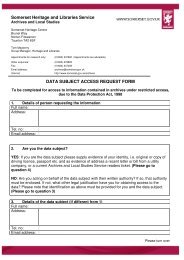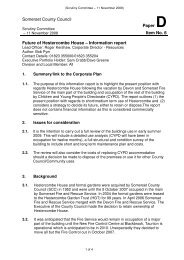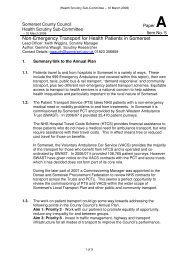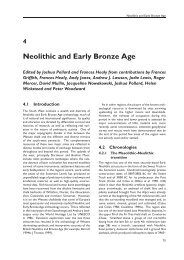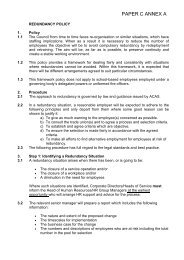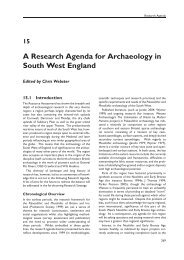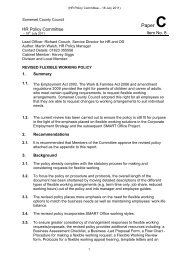Service Reviews â Outline Business Case - Somerset County Council
Service Reviews â Outline Business Case - Somerset County Council
Service Reviews â Outline Business Case - Somerset County Council
Create successful ePaper yourself
Turn your PDF publications into a flip-book with our unique Google optimized e-Paper software.
(Cabinet – 2 May 2012)<br />
1 Scope and context<br />
1.1 Background<br />
<strong>Somerset</strong> <strong>County</strong> <strong>Council</strong>’s (SCC’s) <strong>County</strong> Plan is to become a smaller, more<br />
enabling organisation focused on its customers, with a target operating model that<br />
ensures services are “right sourced”; i.e. that the most efficient and effective<br />
commissioning solution is applied to community needs. The expectation is largely<br />
that in future the <strong>Council</strong> will shape and influence service provision, rather than<br />
provide services directly.<br />
Unlike most other areas of adult social care provision across the country, <strong>Somerset</strong><br />
<strong>County</strong> <strong>Council</strong> still has a large in-house provider service (the “LDPS”) that<br />
supports adults with learning disabilities who have a range of needs that meet Fair<br />
Access to Care <strong>Service</strong>s (FACS) eligibility criteria. The customers supported by the<br />
service are among the most vulnerable people funded by SCC, and include<br />
individuals with complex physical needs, autistic spectrum conditions and those<br />
whose behaviour challenges. The LDPS accounts for 55% of the total spend<br />
against this customer group and supports approximately 900 of the 1600 adults<br />
with a learning disability across the county supported by SCC. The remaining 700<br />
customers are supported through spot or block contracts with external providers or<br />
via Direct Payments. These customers and suppliers are out of scope for this<br />
service review.<br />
It is anticipated that the growing use of Personal Budgets will, over time, lead to<br />
people making different choices about the social care services that they receive,<br />
and will provide additional incentives for service providers to personalise their<br />
response to each individual. It will require providers to operate in a way that<br />
embraces and responds quickly to customer need and market changes. The LDPS<br />
cannot respond fully to these challenges in its current form.<br />
The main issues that the LDPS currently experiences, through being an in-house<br />
service are:<br />
• It is unable to deliver services that are paid for using direct payments. 2<br />
• Its ability to invest in existing properties and source new accommodation in<br />
a timely fashion is restricted.<br />
• It is unable to attract new business other than from the <strong>County</strong> <strong>Council</strong>.<br />
• There is inflexibility in staff terms and conditions.<br />
2 Department of Health, A Guide to Receiving Direct Payments From Your Local <strong>Council</strong>: A Route to<br />
Independent Living, 2009, p16: Question: “Can I purchase services from my local council “<br />
Answer: “You cannot buy services from your local council as it is not allowed to sell its services in this way.”<br />
A - 11



